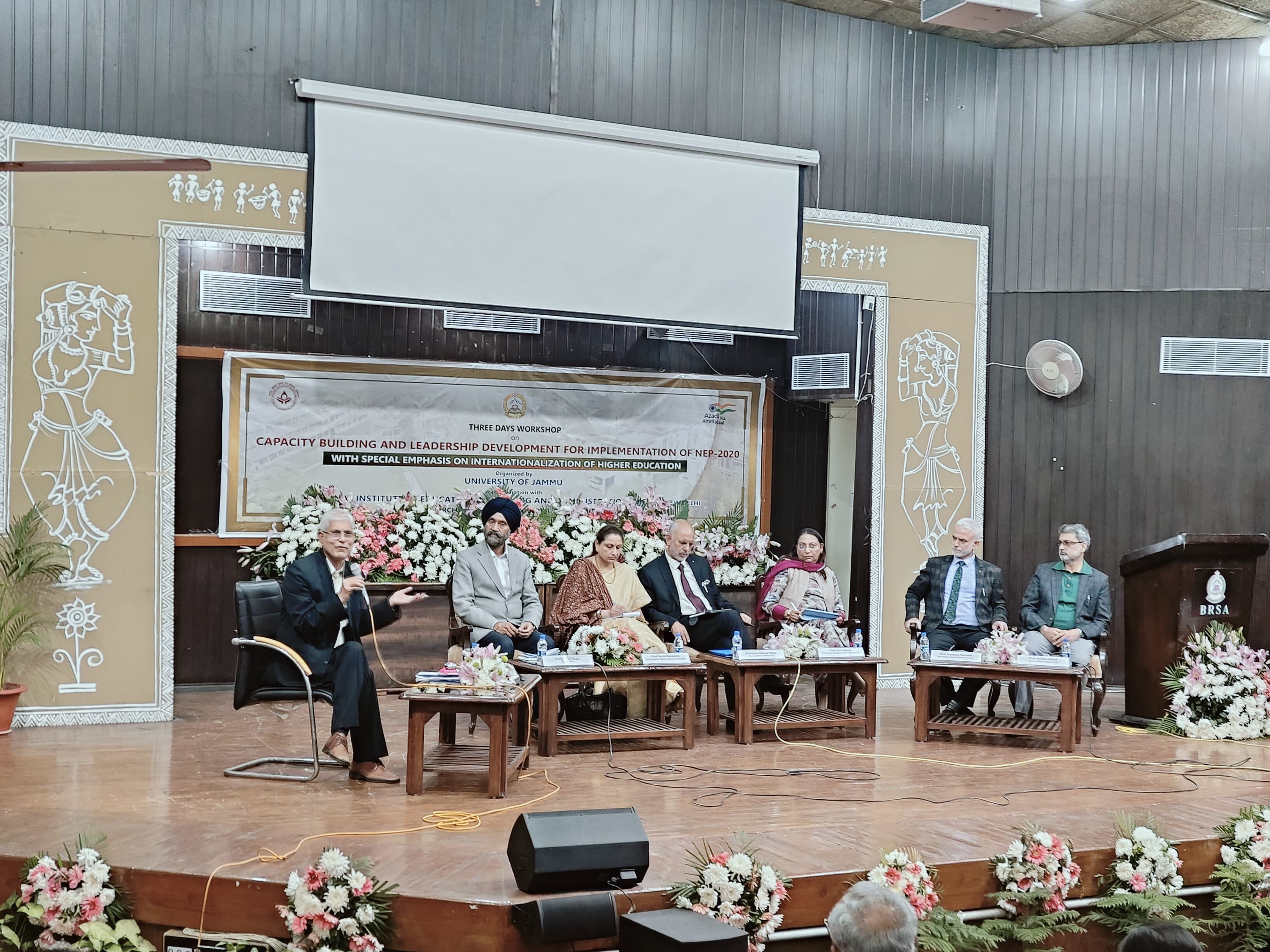About University

Cradled in the lap of mountains at the foothills of auspicious Trikuta, besides the river Tawi at an altitude of 1030 ft. is Jammu. This 'city of temples' has many places...
Enhancing Leaders’ Capacities For NEP-2020 at University of Jammu
 The University of Jammu in collaboration with the National Institute of Educational Planning and Administration (NIEPA) successfully inaugurated a three days workshop aimed at enhancing capacity building and leadership skills for the effective implementation of the National Education Policy 2020 (NEP - 2020). The workshop aims at internationalization of higher education, commenced on March 12, 2024, at the University of Jammu campus.
The University of Jammu in collaboration with the National Institute of Educational Planning and Administration (NIEPA) successfully inaugurated a three days workshop aimed at enhancing capacity building and leadership skills for the effective implementation of the National Education Policy 2020 (NEP - 2020). The workshop aims at internationalization of higher education, commenced on March 12, 2024, at the University of Jammu campus.
The workshop was inaugurated by the Lieutenant Governor, Manoj Sinha, who commended the initiative as a significant step towards reforming the educational landscape of Jammu and Kashmir. In his keynote address, he emphasized on the importance of aligning educational institutions with the vision of Hon'ble Prime Minister Shri Narendra Modi to lead the nation's educational reforms.
He outlined five key aims and vision to establish a robust foundation for future-oriented education, stressing the need for creativity, innovation, and mentorship in classrooms. He urged educational institutions to become hubs of skill development and innovation, fostering an environment conducive to creativity and intellectual growth. Prof. Umesh Rai, shared valuable insights during the inaugural session.
Day two of the workshop featured six enlightening sessions focusing on various aspects of educational reforms and innovation.
The theme centered on developing imaginative and flexible curriculum structures for holistic learning. The first panel included Professor Sham Lal Narayan, A Historian’s Perspective: Prof. Shyam N. Lal, Jammu University , Cognitive Learning and Psychological Perspectives: Dr. Amitash Ojha, IIT Jammu, Insights on multidisciplinary learning: Dr Sayantan Mandal, IIT, Jammu , Perspective from Teaching of IR and Politics: Prof. Rityusha Tiwari, DU, Associate Fellow, Institute of China Studies. Distinguished panellists highlighted the importance of critical thinking, multidisciplinary learning, and innovative teaching methodologies in nurturing students' intellectual growth.Dr. Amitash Ojha, IIT Jammu: Presented cognitive learning and psychological perspectives, emphasizing the organic nature of learning and the need to address the rigidity of the education structure.
Dr. Sayantan Mandal, IIT Jammu: Discussed insights on multidisciplinary learning, focusing on the importance of skills acquisition and the intrinsic and extrinsic processes of education.
Prof. Rityusha Tiwari, DU, Associate Fellow, Institute of China Studies: Shared perspectives from the teaching of IR and Politics, emphasizing engagement within the micro space of the classroom and the importance of globalization and economic integrity in curriculum development.
Under the theme of Education Experts Discuss Curriculum Structure Challenges and Solutions Prof. Sudhanshu Bhushan, Chairperson of the session from Delhi's NIEPA, emphasised academic freedom and diversity of views in curriculum development. He referenced the Radha Soami commission's report to underscore the importance of curriculum.
Naveen Anand DAA of CU Jammu highlighted three challenges faced by cluster universities: multidisciplinary approach courses, skill internships, and research projects.
Prof. Farooq Ahmed Masoodi, from the University of Kashmir, stressed tackling challenges at a microscopic level while ensuring fulfillment of intellectual and academic thirst without compromising the core of education.
Prof. Anju Bhasin, from the University of Jammu, emphasized the need for flexible, self-learning curriculum to enhance critical thinking and collaborative research among youngsters. Prof. A.H. Moon advocated for designing degree programs that incorporate practical knowledge over theoretical learning, emphasizing the importance of feedback and evaluation.
Prof. Neelu Rohmetra, Dean of Research Studies at Jammu University, discussed the necessity of flexibility in curriculum to adapt and adopt, citing examples from premier institutions globally.
Dr. Balbeer Singh of SMVDU addressed four challenges: multidisciplinary approach, mandatory courses, objective evaluation systems, and preparing students to become job providers rather than seekers by closely associating faculty with industries for internship opportunities.
The panelists collectively stressed the importance of addressing challenges in curriculum structure through flexibility, practical learning, and industry collaboration.
Under the theme "Leveraging Digital Technologies, Online Learning, and New Pedagogies of Higher Education," the second session of day 2 featured insightful presentations and discussions.
Chaired by Professor Anuj Bhasin of Jammu University, the session welcomed speakers Dr. Amitash Ojha from IIT Jammu, Prof. Ayaz Hassan Moon from the Department of ECE, Islamic University of Science and Technology, J&K and Prof. Vijay Lakshmi Brara from the Department of Sociology, Royal Global University, Guwahati, Assam.
The University of Jammu introduced an innovative program titled "Design Your Degree," aimed at empowering students to pursue their passions and become job creators. Vice-Chancellor Prof. Umesh Rai outlined the program's dynamic nature and its focus on holistic development. In this session Prof. Umesh Rai reiterated the significance of the "Design Your Degree" program and emphasized its alignment with the NEP - 2020 objectives and its potential to foster critical thinking and digital literacy among students.
Prof. Ayaz Hassan Moon's presentation highlighted the transition from Digital India to National Digital University. He emphasized the adoption of flipped teaching, a blended teaching approach, and various other essential aspects to enhance digital learning.
Prof. Vijay Lakshmi Brara underscored the necessity of adapting to technological advancements. She emphasized embracing multimedia projects and utilizing AI tools without fear, emphasizing their potential for assistance. She asserted that technological progress is inevitable and should be embraced rather than resisted.
The session provided valuable insights into harnessing digital technologies in higher education, emphasizing the need for adaptation and integration of innovative pedagogies. Addressing the theme of leveraging digital technologies in higher education, speakers emphasized the need to adapt to technological advancements and incorporate online learning platforms for enhanced pedagogical practices.